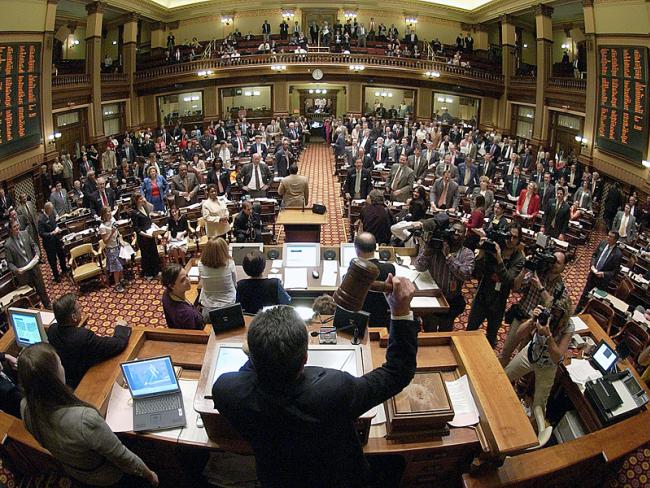By: Rob Oldham

Campus carry is dead. Students in Georgia will still be unable to carry concealed weapons on college campuses. State House Republicans bowed to the opposition of the Board of Regents and left out the provision in their 2014 reworking of the notorious Safe Carry Protection Act (HB 512) which contained campus carry in 2013. HB 512 failed to pass the State Senate last spring, despite a Republican majority. The new bill, HB 875, was introduced without language that would have given university presidents the discretion to decide whether or not to allow concealed weapons to be carried on campus. Rep. John Meadows said that although it was seriously considered, the discretion clause flunked the constitutional test and was not included because “the power designated to the General Assembly can’t be given to university presidents.” The exclusion of a discretion clause raises pertinent questions about how much autonomy colleges and students should have when there is conflict over state law.
The Georgia State Constitution settles the issue of university firearm rights quite easily in a legal sense. Article 1 paragraph VIII unambiguously reads “the General Assembly shall have the power to prescribe the manner in which arms may be borne”. It is clear that the issue of firearm regulation is one for the legislature to decide instead of an unelected university president. To drive this point even further home, HB 512 section 8 stated “since regulation of firearms is an issue of statewide concern, only the General Assembly can make laws about gun regulation”. Even disappointed proponents of campus carry laws acknowledge the domain of the General Assembly and acquiesce that changes in gun laws must come at the state, not local, level. Jason Stubbs, State Director of Students for Concealed Carry, said in an interview “a public university is funded by the same tax dollars from both gun owners and non-gun owners. The state has the obligation to prosecute and incarcerate law breakers, so they should maintain control over who is considered a criminal.” This has certain logic to it.It is difficult to legally refute what Stubbs has said because there is a slippery slope involved once universities get to decide what constitutes criminal activity instead of state statutes.
Despite this, a discretion clause would be prudent and reasonable given that campus carry laws primarily affect college students (not the entire populace) and campuses have unique safety issues and attitudes towards guns. 23 states currently give university presidents discretion over campus carry. A similar policy in Georgia would take into account the vast differences between campus environments across the state. A comparison of counties across the state shows that circumstances relating to personal protection widely differ on a case by case basis. Fulton County, the home of Georgia Tech, Georgia State, and various other universities, registered 128 murders, 225 rapes, and more than 3,500 robberies in 2012. Compare that to Lumpkin County, home of the beautiful University of North Georgia in Dahlonega, where zero murders, 11 rapes, and two robberies occurred.
The General Assembly is fairly removed from campus life and is not likely to heed the dispersed appeals of concerned students on both sides of the issue. President’s discretion would give students a chance to have their voices heard. Take the University of Georgia as a case study. Recently retired UGA President Michael Adams did not approve of campus carry. Yet he, and his successor Jere Morehead (who has not addressed campus carry during his brief tenure), cannot ignore that the Athens environment is more similar to urban Georgia Tech than the peaceful pines of Dahlonega. There were 222 serious crimes reported to the UGA police in 2012. If President Morehead were given discretion, campus carry would be his decision, but it would not be decided in a personal vacuum. He would have to justify his decision to passionate issue lobbyists. Organizations such as the Students for Concealed Carry and the Young Democrats represent strong opposing views of campus carry. The Student Government Association speaks for the student body at large. Students would feel more integrated in the policy making process if they could influence the President through organizations like these. Decisions would be made within the community rather than by distant legislators who have no skin the game. After all, it is the students that will have to live in the environment created by the law, not the General Assembly.
In the wake of national tragedies, gun law is a particularly divisive issue. In his uproar against campus carry last year, the Chancellor of Georgia’s University System Hank Huckaby said “adding weapons to an already volatile mix of youthful exuberance, stress, and alcohol could lead to a tragedy of our making that we could otherwise avoid.” On the other side of the coin, UGA student Karl Brust spoke out in favor of the law. “I am of legal age for owning a firearm. Many of my classmates are of legal age to carry a concealed weapon; they are not kids either. I ask you to reconsider your stance on campus carry; you aren’t the one that has to go to class disarmed and vulnerable every day of the week.”
These divergent points of view make it clear that gun laws are not one size fits all. People are going to disagree and attitudes vary by locality. Local squabbling over General Assembly bills is not unique to gun laws, but campus carry is a different situation. Colleges already have the power to tailor their particular environment through housing regulations and by developing a code of conduct to promote their vision of student safety and well being. Moreover, there is no practical need for a uniform campus carry law that would lead to different receptions and outcomes on various campuses. College is a time for students to develop their autonomy; they need to be able to directly influence the code that determines their personal safety. In order for change to come about this way, Georgia code would have to be changed (at the expense of the legislature’s power) and the state constitution might even need amending. Meaningful change always come gradually; however, the benefit to Georgian universities and college students who are in serious need of political efficacy and involvement in the process would be prodigious.

